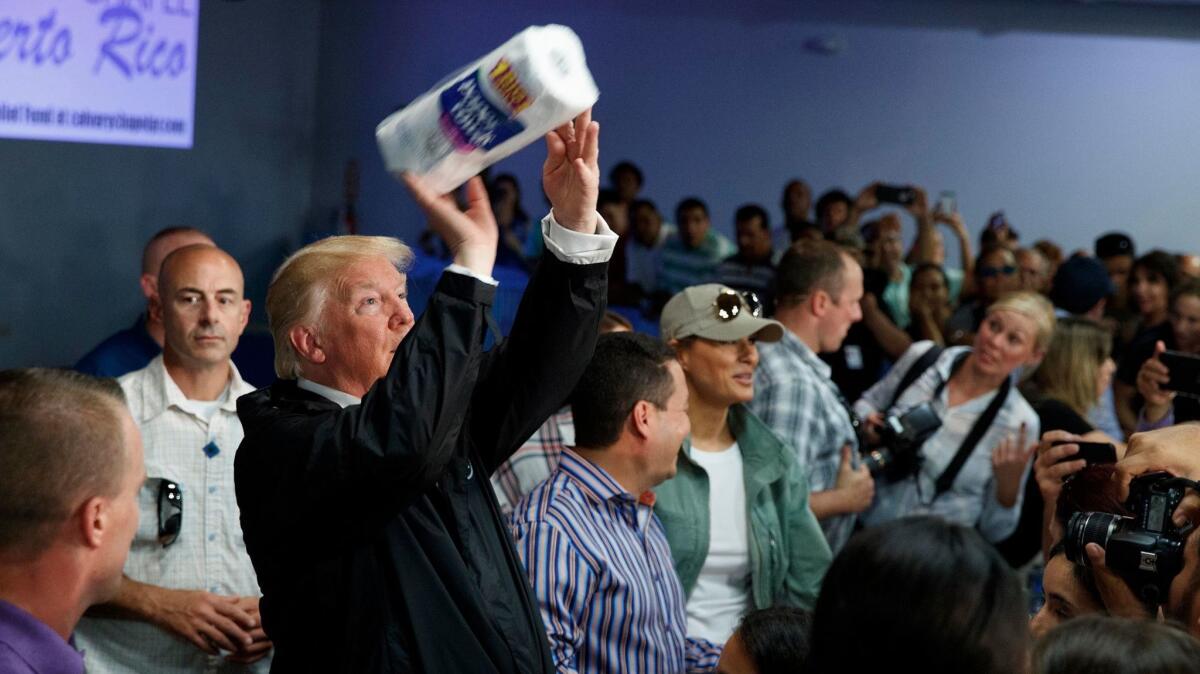Op-Ed: Donald Trump is a textbook racist

- Share via
Civil rights advocates, social scientists and regular citizens have all called out President Trump as a racist in recent weeks. The president’s supporters have countered with stories about the blacks and Latinos he has hired or befriended, and with personal testimonies: “I’ve known Donald Trump for many years. He doesn’t have a racist bone in his body.”
As a professor who researches and teaches courses on the health effects of race, racism and inequality, I can assure you that the president’s defenders are wrong. Trump is a racist. What he says and does meets the scholarly definition of the term.
Broadly speaking, a racist combines negative prejudicial biases with sufficient power to leverage action against targeted groups. Trump’s words and behaviors demonstrate considerable prejudicial bias, and, as president of the United States — arguably the most powerful office in the contemporary world — he has indeed leveraged action against various groups.
Broadly speaking, a racist combines negative prejudicial biases with sufficient power to leverage action against targeted groups.
Racism is predicated on belief in the scientifically discredited concept of biological race. Skin color simply has no correlation with significant inherent distinctions among human beings. However, “race” in the past and now has led to notions of a natural hierarchy among various populations. In the United States, it was used to justify stealing labor from black Africans through slavery and stealing land from red Native Americans through forced relocation and genocide.
As far back as Colonial days, northwestern European immigrants placed themselves at the pinnacle of the pecking order while relegating populations of color and other ethnic groups to inferior positions. False perceptions of inherent differences in traits, such as intelligence or work ethic, have been systematically associated with geographic origin, ancestry, skin color or some combination of all three.
Those supposed differences have justified restricting some groups’ access to resources and exposing them to all manner of risks in every sphere of life — cultural, educational, political and economic.
Scholars break racism into multiple categories:
- Structural racism: Assigning social value to human populations contingent on misperceptions of inherent differences.
- Symbolic racism: Rhetoric that delegitimizes others.
- Institutional racism: Incorporating and formalizing misperceptions of differences into society through public policy.
- Interpersonal racism: Acting on such misperceptions in direct or face-to-face interactions.
- Insidious racism: Unconscious belief in and perpetuation of these phenomena.
- Internalized racism: Among victimized populations, accepting and manifesting negative portrayals.
- Systemic racism: The influence of these phenomena at multiple levels and across multiple dimensions of society.
Trump’s insensitive, disrespectful and mean-spirited statements and actions partake of all these variations.
Throughout last year’s campaign and his first eight months in office, the president has expressed his bias through government orders and the presidential bully pulpit (systemic racism).
Trump argued that as a “Mexican,” U.S. District Court Judge Gonzalo Curiel, who was born and raised in the United States, could not fairly arbitrate lawsuits related to Trump University (structural racism). For years, Trump protested, falsely, that Barack Obama was not born in the U.S. and was consequently elected illegitimately (symbolic racism).
The Trump administration cut funds for Department of Homeland Security programs to combat right-wing fascism and white supremacy and it slow-walked Hurricane Maria aid to Puerto Ricans who “want everything done for them,” in the president’s words (institutional racism).
Trump’s actions, according to a growing number of mental health professionals, reveal deep-seated and possibly unconscious prejudices (insidious racism). He blatantly and directly disrespected Gold Star parents of South Asian origin (interpersonal racism).
In response to the Trump travel ban, his threat to “deport them all” and his promise to build a wall on the border, many targeted immigrant populations report increased levels of social insecurity, anxiety and distress. Research demonstrates that among children, the result of such stress is compromised academic performance (internalized racism).
Trump and his supporters seem to believe that simple protestations to the contrary are sufficient to refute and erase his actions. Despite these claims, some in the Republican Party recognize the truth. Rep. Will Hurd of Texas and Sens. Lindsey Graham, Jeff Flake, John McCain and Mitch McConnell have all specifically spoken out against Trump’s worst behavior.
Perhaps House Speaker Paul D. Ryan said it best when he responded to Trump’s statement about Curiel. “Isn’t that the textbook definition of racism?” Ryan asked.
The answer is simple: Yes, it is.
Jay A. Pearson is an assistant professor in the Sanford School of Public Policy at Duke University.
Follow the Opinion section on Twitter @latimesopinion and Facebook
More to Read
A cure for the common opinion
Get thought-provoking perspectives with our weekly newsletter.
You may occasionally receive promotional content from the Los Angeles Times.









